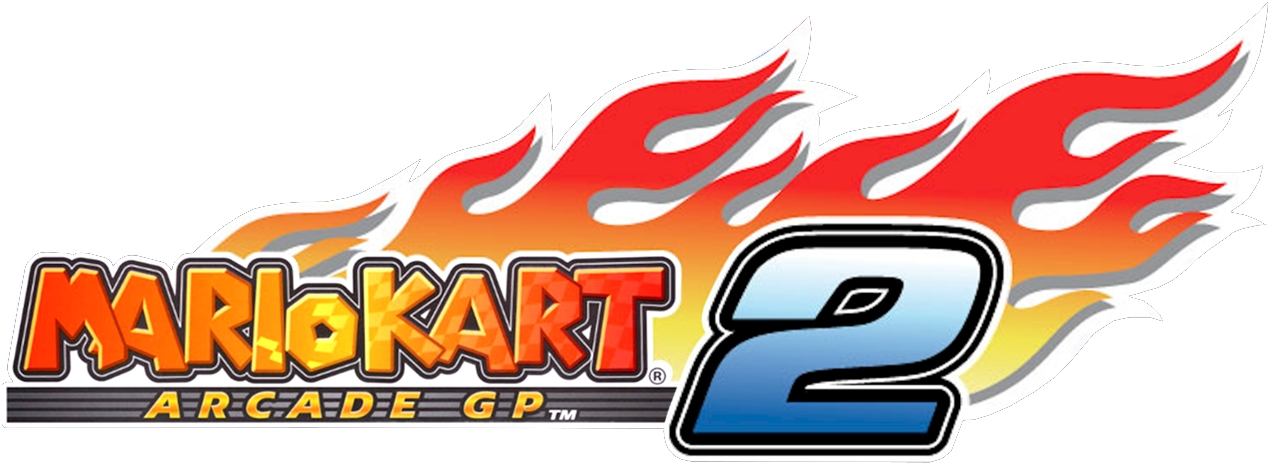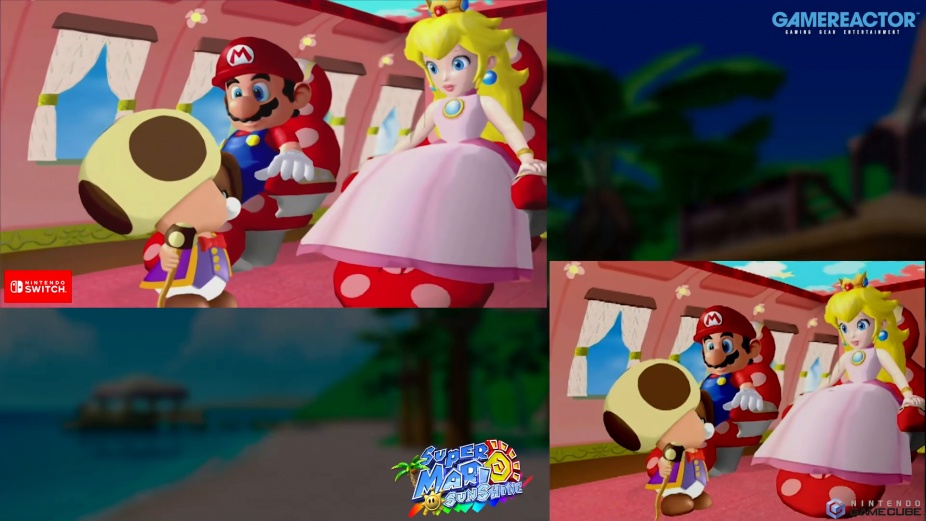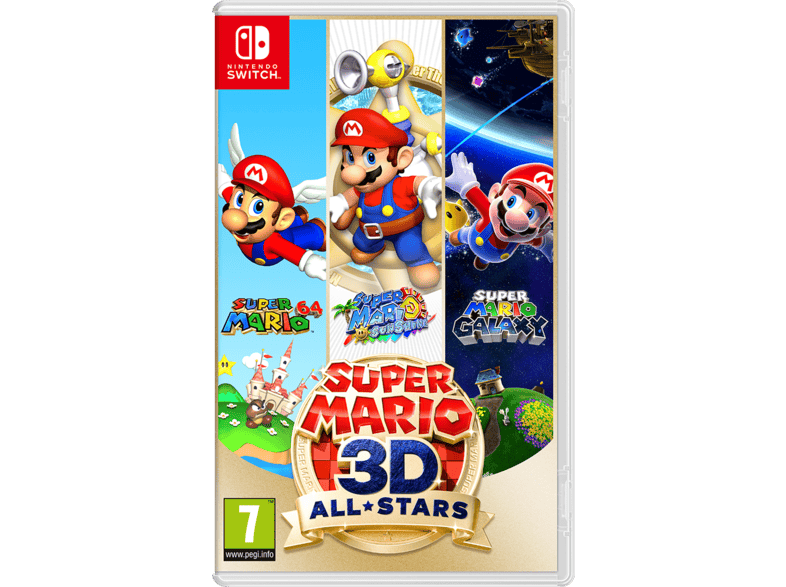- Super Mario 3d Collection Price
- Super Mario 3d Collection Wiki
- Super Mario 3d Collection Amazon
- Super Mario 3d Collection Wiki
Decades after the release of Super Mario All-Stars on Super NES, Nintendo revisits the concept with Super Mario 3D All-Stars - a compilation featuring Super Mario 64, Super Mario Sunshine and Super Mario Galaxy. Each of the three games has received several enhancements in their Switch debut but is it enough? Is this time-limited release actually worthy of the All-Stars name?

Despite its minimal trimmings, Super Mario 3D All-Stars is a worthwhile collection of some of the plumber's most memorable adventures. 8 Used from$175.96. BONUS CALENDAR - a 13 month calendar with special Mario dates and artwork is included. Art Section - this collector's edition exclusive shows the wonderful artwork of Super Mario 3D World. Find Everything - fully labeled maps show the locations for every single power-up.
There's a proud legacy here. When Nintendo released Super Mario All-Stars for Super NES back in the early 90s, it made a huge impact with the development team completely reworking the 8-bit Mario games at 16-bit quality, with new art, sound and features - an ambitious but amazing project. It may not have been the first remake to hit the market, but it was a shining example of how modernising prior generation titles could deliver a massive pay-off.


Super Mario 3D All-Stars, however, is different - rather than remaking these games, Nintendo has instead opted to update them in a more subtle fashion to better mesh with modern displays running at higher resolutions, but using emulation as the basis. Any enhanced assets you might see, such as new textures or improved video playback, are essentially injected into each game. The emulation was apparently developed by Nintendo's European Research and Development group and, curiously, seems to rely on the Vulkan API - not NVN, Nintendo's own low-level API. Even more unexpected, according to Twitter user OatmealDome, Super Mario Galaxy was recompiled to run natively on the Switch's ARM processor but most other tasks, such as graphics rendering, are handled via emulation - a hybrid approach. In theory, we're looking at a solution here that could be applied to future Nintendo GameCube and Wii titles, which is cool.
The fact that the games are not remakes is a little disappointing, but emulation is not necessarily a bad thing and while each game has its share of quirks, enough changes have been made to smooth over the experience. Where I do feel the collection falls short is now Super Mario 64 is handled. Yes, you get a resolution uptick from 320x240 to 1280x720 - but it's 720p in both docked and handheld modes, which doesn't quite make sense. Even unofficial homebrew ports have been shown to run at 16:9 and at 60fps no less - it's disappointing to see that the Switch version is pegged at 30fps instead.
Despite this, it looks surprisingly nice bearing in mind how few N64 titles still look good when blown up to modern rendering resolutions. While I would have enjoyed proper 1080p support rather than 720p across both modes, the game appears very sharp on Switch. This is due in part to the enhancements made to the game's UI elements. All fonts and HUD artwork have been redrawn at a higher resolution, aiming to mimic the look of the original game and it elevates the presentation on a modern screen. The lag from the Wii U Virtual Console release is done, but it is a shame that Nintendo did not replicate N64's unique texture filtering set-up as Nightdive Studios did with its far more impressive handling of Doom 64.
Super Mario Sunshine is more interesting. Unlike Super Mario 64, this game has never received an official re-release so it's interesting to see how it translates to Switch. More so than Super Mario 64, Sunshine really benefits from the jump to Switch. It's a game that's dense on detail and at the original 480p, this results in a somewhat noisy image where it's difficult to see distant objects. On Switch, however, the resolution is bumped to a full 1080p (yes, higher than Super Mario 64) and the aspect ratio is increased to 16:9. The combination of these elements really opens up the game in a big way, especially as it's easier to visually parse each stage from a distance, improving the overall feeling of navigation. Furthermore, in the original, the HUD is simply too large occupying a significant portion of the screen at any point. With the HD version, however, HUD elements are smaller and pushed out to the edges of the screen. It's a nice change.
Like Super Mario 64, numerous elements have been updated for modern displays. The entire UI has been re-created in a higher resolution with sharp, clean fonts and art design. Furthermore, textures appear sharper than in the original and in some cases, it almost appears as if they used some sort of upscaling technique to enhance detail in the artwork. It's not a game changer but it definitely improves image quality slightly. On a related note, this title also has far superior video sequence playback to the GameCube original - it looks like some kind of AI upscaling is used. It's not perfect, but it's a huge improvement.
The only disappointment? Once again, it's frame-rate. Nintendo opts to stick to its guns and run the game at 30 frames per second like the original. However, it's more disappointing in this case as early prototypes of Sunshine were shown at a full 60fps - the final game was a step down in that sense. Furthermore, when using a Wii console, the homebrew community has even managed to uncap the frame-rate allowing Sunshine to run at 60fps. Doubling frame-rate is definitely achievable - and once again, it's disappointing that Nintendo didn't go the extra mile. Worse still, there are now mild frame pacing issues that pop-up during play. In this sense, it's not even as fluid as the original GameCube release.
Targeting the more powerful Wii, Super Mario Galaxy really demonstrated Nintendo's ability to push limited hardware to its limits, with flawless art direction and a brilliant 60fps presentation. Like Sunshine, it aims for a full 1080p but this time around, it seems to use some sort of resolution scaling based on what's happening on-screen, so image quality isn't quite as perfect.


The good news is that menus and HUD elements have all received a fresh coat of paint with higher resolution assets and they look great. On top of that, the video sequences are also delivered at a much higher quality, albeit with a slightly washed out image. Unfortunately, not everything is quite perfect. Galaxy relies on a lot of wide-open scenes with dramatic colour gradients and transparency effects to create the illusion of space. On Switch, these effects are reproduced with significant colour banding. It doesn't necessarily spoil the visuals as it's not evident in all scenes, but you will spot it and it can be distracting. At least performance is pretty much perfect - it's mostly locked and feels great to play.
Summing up the entire package, it's difficult to avoid the conclusion that these new releases are competent and reasonable enough, but as a celebration of Mario, Nintendo clearly under-delivers. Each game represented in this collection receives enhancements - especially in relation to textures and UI elements - and it's clear that they put time into ensuring the games felt right. The fact that they even went so far as to carefully improve the full-motion videos suggests that they did care. But why is Super Mario 64 running at the lowest docked resolution in the entire package when it is the least demanding game? Why does it present at 4:3 and why only 30fps? Sub-par frame-pacing in Super Mario 64 and Super Mario Sunshine is also a disappointment.
What saves this collection from a more damning appraisal is simply the quality of the games themselves - all of which are excellent in my opinion, even the divisive Super Mario Sunshine. In that sense, you can purchase this collection safe in the knowledge that you're going to have a lot of fun - the Nintendo magic is still there. However, as an extension of the All-Stars legacy, this is a disappointment - and you can't help but get the feeling that Nintendo could have done so much more with these games.
Super Mario 3d Collection Price
Will you support the Digital Foundry team?
Digital Foundry specialises in technical analysis of gaming hardware and software, using state-of-the-art capture systems and bespoke software to show you how well games and hardware run, visualising precisely what they're capable of. In order to show you what 4K gaming actually looks like we needed to build our own platform to supply high quality 4K video for offline viewing. So we did.
Our videos are multi-gigabyte files and we've chosen a high quality provider to ensure fast downloads. However, that bandwidth isn't free and so we charge a small monthly subscription fee of €5. We think it's a small price to pay for unlimited access to top-tier quality encodes of our content. Thank you.
This year marks the 35th anniversary of Super Mario Bros.for the Nintendo Entertainment System. As a way of celebrating, Nintendo recently announced a slew of new and re-released titles coming to the Nintendo eShop. However, there are a few details to these new releases that may come as a severe disappointment to some hardcore fans.
During this week's Nintendo Direct, the company showed off a new battle royale title called Super Mario Bros. 35, as well as an impressive HD collection of some of Mario's 3D adventures. The collection is aptly named Super Mario 3D All-Stars and it is a bundle featuring the classic games Super Mario 64, Super Mario Sunshine, and Super Mario Galaxy. While fans are obviously over the moon with this announcement, there is a glaring omission that is bugging plenty of people. The question on the minds of many Mario fans is: where is Super Mario Galaxy 2?
It's not as though the game is an embarrassment to the series or anything. If Super Mario Galaxy 2 had been poorly received or vastly underperformed when it was released, then it would make a certain amount of sense for Nintendo to sweep it under the rug like this. However, that's not at all what happened when the game made its debut.
At the time of release, Super Mario Galaxy 2 was beloved by fans and gaming journalists alike. IGN's Craig Harris gave the game a perfect score, writing that it improved on every aspect of the original that worked so well, but also added plenty of new content and big ideas. Harris wrote, 'if anything, the reason why Super Mario Galaxy 2 is so damn fantastic is mostly due to the fact that the team learned from the first game ... The result of that effort is one of the most refined and most fulfilling videogame experiences of this generation.'
The review concluded, 'Most of all, Super Mario Galaxy 2 perfectly captures that classic videogame charm, the reason why most of us got into gaming from the start.'
The second Galaxy game was so beloved that many fans still wonder if there will ever be another sequel to the series. Fans are trying to figure out why exactly the game hasn't been included in the 3D All-Stars collection. Video game blogger 9 Volt wrote, 'Super Mario Galaxy 2 is the best Mario game. this collection is not complete without Super Mario Galaxy 2.'
Super Mario 3d Collection Wiki
Meanwhile, games industry analyst Daniel Ahmad made some jokes about the situation, saying that Nintendo couldn't get the rights to Super Mario Galaxy 2 from Nintendo. Basically, there seems to be no legal reason why Super Mario Galaxy 2 couldn't be included in the new collection.
However, the absence of Super Mario Galaxy 2 isn't the only disappointing factor in this release for fans. There's also the bizarre choice on the part of Nintendo to only offer the game bundle for a limited time. Super Mario 3D All-Stars will only available until March 31, 2021, after which it will apparently be gone from the Nintendo eShop forever. That also goes for Super Mario Bros. 35, which will be released on October 1 and will leave the Nintendo eShop on the same day as Super Mario 3D All-Stars.
It's unclear why Nintendo has made this choice. It could be that the company is trying to stress that this is only being released as a 35th anniversary promotion. On the other hand, the limited time availability may also be a tactic from Nintendo to drive sales upon release. This is obviously a bummer, but it also means that anyone who is on the fence about snagging Super Mario 3D All-Stars (or Super Mario Bros. 35) needs to go ahead and get it while the getting's good.
Also, this doesn't necessarily mean that Super Mario Galaxy 2 won't ever be coming to the Switch. Screen Rant posited that Nintendo may simply be waiting to announce a Super Mario Galaxy 2 remaster as a follow-up to the 3D collection, hopefully ensuring that fans who loved the first one will quickly snap up the second one.
Super Mario 3d Collection Amazon
Luckily for fans, some of the upcoming celebratory Mario releases will be available for plenty of time to come. A reissue of the original SNES Super Mario All-Stars has just been added to Nintendo Switch Online, and that title notably doesn't have an expiration date attached to it. Neither does Super Mario 3D World + Bowser's Fury, an enhanced version of the Wii U's Super Mario 3D World that launches in February of next year.
Super Mario 3d Collection Wiki
While the exclusion of Super Mario Galaxy 2 is clearly a disappointment for fans, it seems like Super Mario 3D All-Stars is still shaping up to be a loving tribute to some of the heroic plumbers greatest adventures. Super Mario 3D All-Stars will be released on the Nintendo eShop on September 18. Get ready to hunt down some Stars and clean up Shadow Mario's graffiti.
